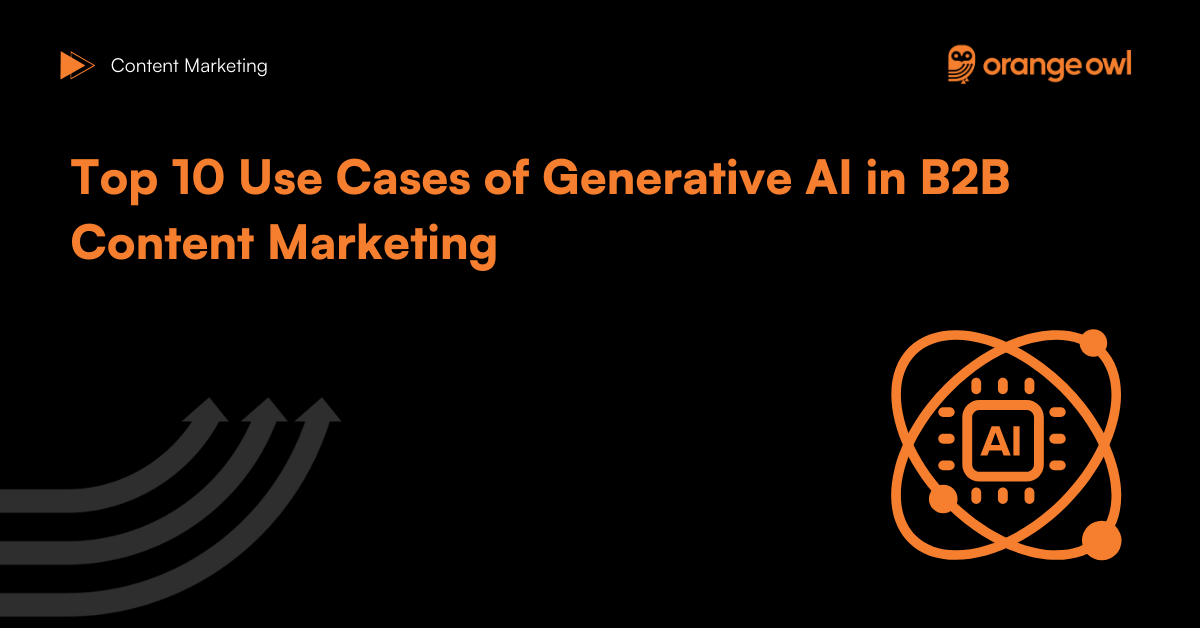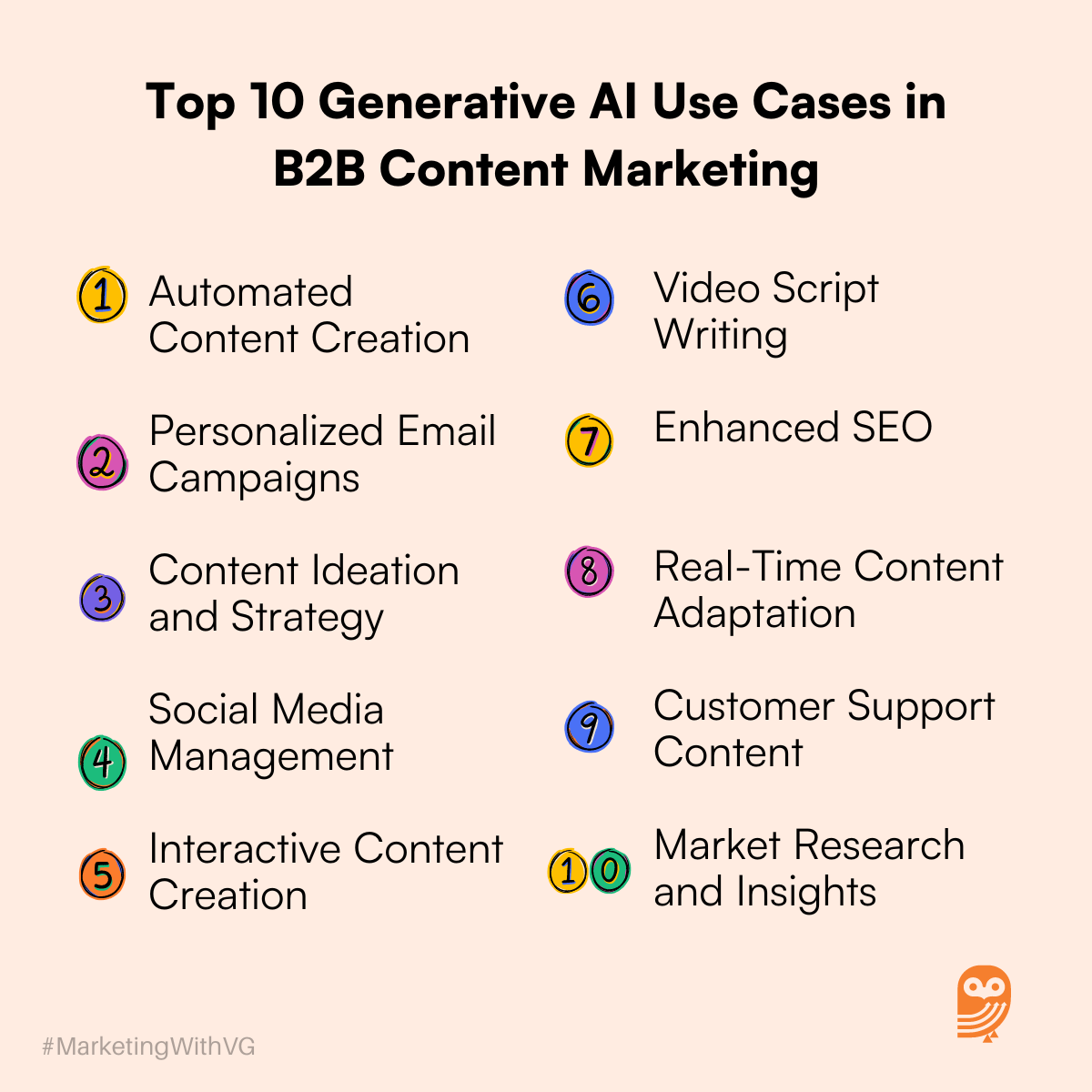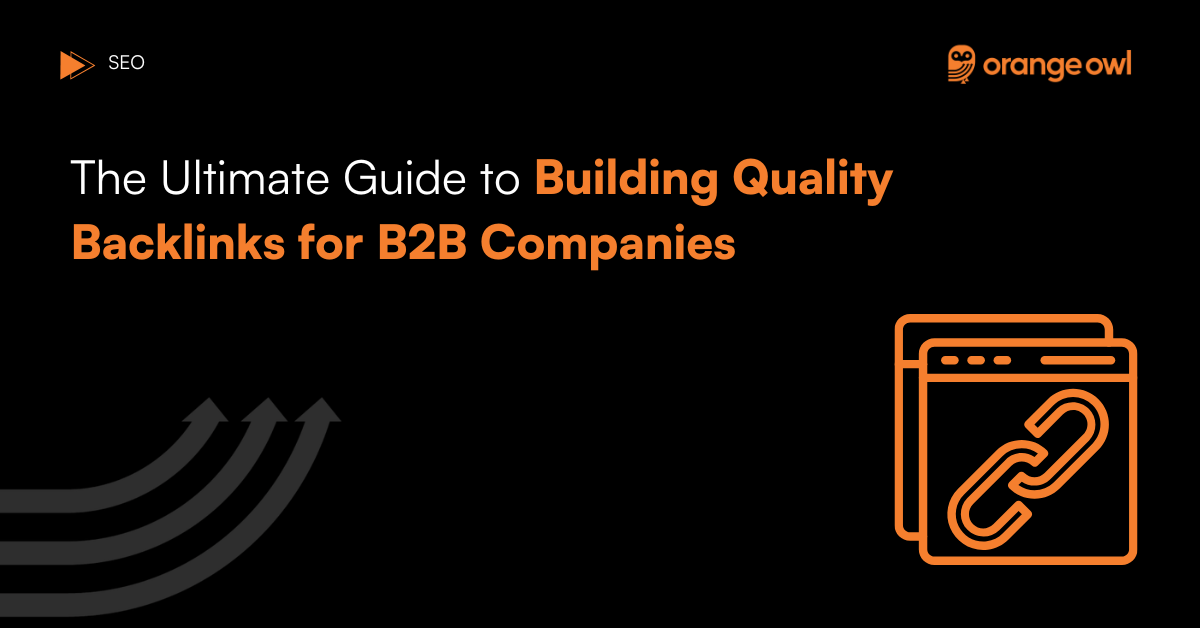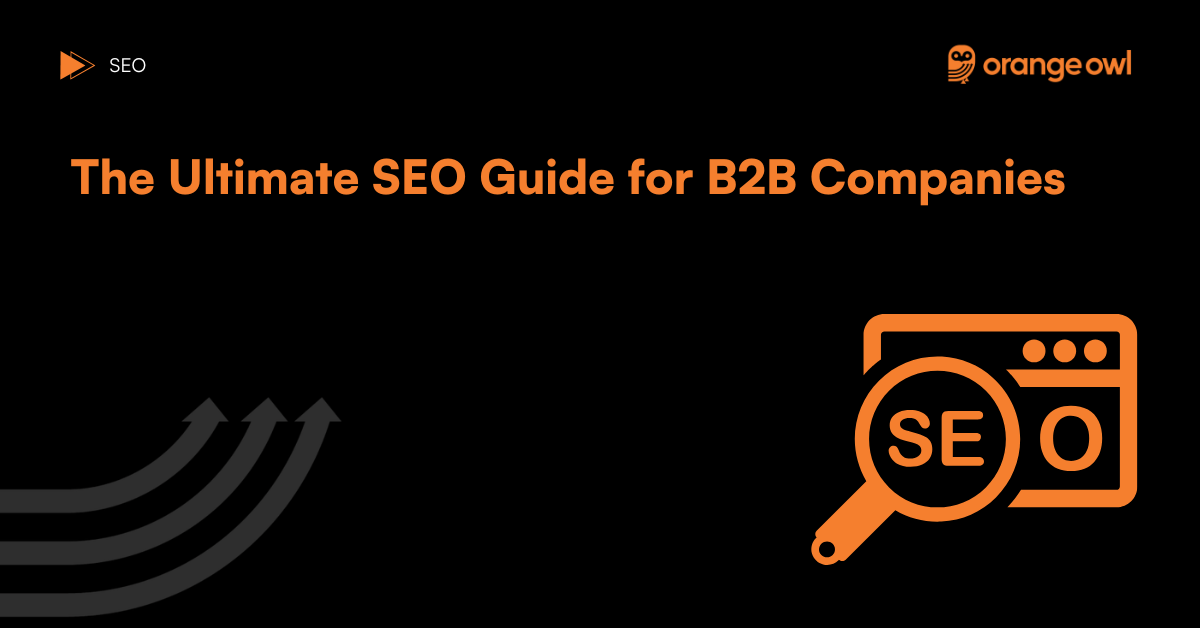Top 10 Generative AI Use Cases in B2B Content Marketing
Vivek Goel
January 28, 2025

Table of Contents
Introduction
Generative AI is revolutionizing the field of content marketing, especially for B2B businesses. By automating and enhancing various aspects of content creation, generative AI allows marketers to focus on strategy and creativity. In this blog, we’ll explore top 10 generative AI use cases in B2B content marketing, complete with real-world examples and practical insights.
Top 10 Generative AI Use Cases in B2B Content Marketing
1. Automated Content Creation
Generative AI tools like GPT-4 can create high-quality written content quickly and efficiently. This includes blog posts, articles, and whitepapers that are essential for thought leadership in B2B marketing.
Example: A B2B technology firm uses AI to generate weekly blog posts on industry trends. The AI writes drafts based on provided outlines, which are then polished by human editors. This reduces the content creation time by half and allows the firm to publish more frequently.
2. Personalized Email Campaigns
AI can personalize email content based on customer data, improving engagement and conversion rates. Tools like HubSpot and Marketo leverage AI to tailor email content to individual preferences and behaviours.
Example: A B2B SaaS company uses AI to analyze user behaviour on its platform and sends personalized emails with relevant content and product recommendations. This personalization leads to a 20% increase in open rates and a 15% boost in click-through rates.
3. Content Ideation and Strategy
Generative AI can analyze market trends, customer feedback, and competitive content to suggest new content ideas. This helps B2B marketers stay ahead of the curve and address relevant topics.
Example: A B2B consulting firm uses AI to monitor industry news and competitor blogs. The AI generates a list of trending topics and content gaps, allowing the firm to create timely and valuable content for its audience.
4. Social Media Management
AI tools like Hootsuite and Sprout Social can automate social media posting and engagement. They can generate post ideas, schedule content, and even interact with followers.
Example: A B2B logistics company uses AI to manage its LinkedIn account. The AI schedules posts responds to common inquiries, and analyzes engagement metrics to optimize future content, freeing up time for the marketing team to focus on strategy.
5. Interactive Content Creation
Generative AI can create interactive content such as quizzes, calculators, and chatbots, which engage users and collect valuable data.
Example: A B2B financial services firm uses AI to develop an interactive ROI calculator for their website. This tool helps potential clients estimate their savings and benefits, leading to a higher conversion rate of inquiries into leads.

6. Video Script Writing
AI can generate video scripts based on provided input, making it easier to produce engaging video content. Tools like Pictory assist in creating video scripts and even generate video snippets.
Example: A B2B healthcare company uses AI to script videos explaining its services. These videos are used in email campaigns and on social media, resulting in higher engagement rates and a better understanding of their offerings among potential clients.
7. Enhanced SEO
AI can optimize content for search engines by suggesting keywords and meta descriptions and improving readability. Tools like SEMrush integrate AI to enhance SEO efforts.
Example: A B2B e-commerce platform uses AI to analyze its website’s SEO performance and suggest improvements. This leads to better search engine rankings and increased organic traffic.
8. Real-Time Content Adaptation
Generative AI can adapt content in real time based on user interactions and preferences. This is particularly useful for landing pages and dynamic websites.
Example: A B2B software company uses AI to personalize landing page content based on visitor data. Different users see tailored messages and product recommendations, which significantly improves conversion rates.
9. Customer Support Content
AI can generate FAQs, knowledge base articles, and troubleshooting guides, providing customers with instant support.
Example: A B2B IT services firm uses AI to expand its online knowledge base. The AI generates detailed how-to guides and troubleshooting tips, reducing the volume of support tickets and improving customer satisfaction.
10. Market Research and Insights
Generative AI can analyze large datasets to provide market insights, competitor analysis, and customer behaviour trends. Tools like Crimson Hexagon offer advanced analytics capabilities.
Example: A B2B manufacturing company uses AI to analyze social media conversations and online reviews about its products and competitors. This helps them identify market needs and adjust their marketing strategies accordingly.
Conclusion
Generative AI is transforming B2B content marketing by automating tasks, personalizing experiences, and providing deep insights. By leveraging these ten use cases, B2B businesses can enhance their marketing efforts, improve engagement, and drive better results. Embrace the power of AI to stay ahead in the competitive landscape of B2B marketing.
Frequently Asked Questions (FAQs) about Generative AI Use Cases in B2B Content Marketing
Generative AI models like GPT-4 are trained on diverse datasets, which include various language nuances and industry-specific jargon. However, for precise industry-specific content, it’s beneficial to fine-tune the AI with relevant datasets or incorporate human review to ensure accuracy and relevancy. For example, a B2B legal services firm might provide the AI with additional training on legal documents and terminology to enhance the quality of generated content.
Yes, Generative AI can be integrated into content management systems to provide real-time updates and personalization. For instance, a B2B e-commerce platform can use AI to personalize product recommendations and update content based on user behavior and preferences in real-time, enhancing user engagement and satisfaction.
Ethical considerations include ensuring transparency about AI-generated content, avoiding plagiarism, and respecting data privacy. Businesses should disclose when content is AI-generated and ensure that the AI does not produce biased or misleading information. For example, a B2B financial advisory firm should clearly indicate if market analysis or reports are generated by AI and validate the data to maintain credibility.
Businesses can measure the effectiveness of AI-generated content using various metrics such as engagement rates, conversion rates, lead generation, and SEO performance. Tools like Google Analytics, HubSpot, and custom AI analytics dashboards can track these metrics. A B2B software company might track how AI-generated blog posts affect lead generation and sales conversions over time to gauge effectiveness.
To ensure AI-generated content aligns with the brand voice and messaging, businesses should provide the AI with clear guidelines and training materials. Additionally, incorporating a human review process is crucial to refine the content. For example, a B2B marketing agency might create a detailed style guide for the AI and have content editors review and adjust the tone and messaging before publication.


